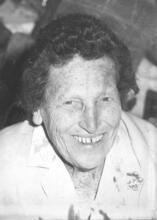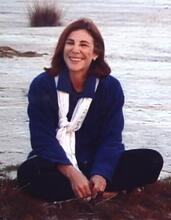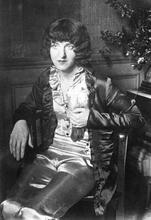Lydia Pasternak
Born in Moscow into a family of highly successful artists, Lydia Pasternak made a name for herself in both scientific and literary realms. She received her doctorate in chemistry from the University of Berlin in 1926 and worked at the German Research Institute for Psychiatry in Munich as an assistant to American neurochemist Irvine H. Page, who was studying the influence of chemical substances on the brain. After the Nazis came to power, Pasternak followed the man who would become her husband to Great Britain; marriage and motherhood prevented her from continuing her scientific career. Throughout her life Pasternak wrote poems, some of which were published. She was an important personality in Oxford’s literary and artistic society and became the preeminent translator of her brother Boris’s poetry.
Lydia Pasternak was a chemist who was compelled to change her profession due to both marriage and second exile. Born and educated in Moscow, she studied in Berlin and worked in science in Munich, but after emigrating to Great Britain she became an outstanding translator of Russian poetry.
Family History & Education
The youngest of four sons and two daughters, Lydia Pasternak was born in Moscow on March 8, 1902. Her father was the great Russian impressionist Leonid Osipovich Pasternak (1862–1945) and her mother, Rozalia (Roza) Isodorovna Kofman (1867–1939), was a famous piano player. Her eldest brother, Boris (1890–1960), became a world-famous poet and novelist and her other brother, Alexandr Pasternak (1893–1982), worked as an architect in Moscow. Her sister Josephine (1900–1993), married to a Pasternak cousin, studied philosophy at the University of Berlin and later wrote on Leonid Pasternak, looked after his paintings, and organized exhibitions.
In 1921, instability resulting from the Revolution led Leonid and Roza Pasternak to move to Berlin with their daughters, while the sons stayed in Moscow. Josephine and Lydia studied at the University of Berlin; Lydia changed from medicine, which she had studied at the University of Moscow between 1919 and 1921, to chemistry, physics, and botany. In 1926 she received her doctoral degree in chemistry and began searching for employment.
Scientific Career
In 1928 Pasternak found a position at the German Research Institute for Psychiatry (Deutsche Forschungsanstalt für Psychiatrie in the Kaiser Wilhelm Institute) in Munich, where the American neurochemist Irvine H. Page (1901–1991), a guest scholar at the institute, created a new research group to study the influence of chemical substances on the brain. Lydia Pasternak was given a position as assistant in Page’s team; together they published several articles on their results in the journal Biochemische Zeitschrift [Berlin, edited by Carl Neuberg (1877–1956)]. Pasternak stayed with the group from August 1928 until April 1935, when the Nazi accession to power two years earlier led to the group’s dissolution. Page returned to the USA and Lydia Pasternak had to seek another place of exile and another position.
At the German Research Institute for Psychiatry (KWI), Pasternak had met the British guest scholar Eliot Trevor Oakeshott Slater (1904–1983), a physician and psychologist. She followed him to Great Britain, where they married in 1935. Pasternak and Slater had four children, two boys and two girls, before divorcing in 1946. Although her marriage to Eliot Slater had enabled her to help her parents and her sister’s family to escape from Germany in 1936 and in 1938, the marriage and the birth of her children prevented Lydia Pasternak from continuing her scientific work.
Poetry Translation & Legacy
Throughout her life, Lydia Pasternak wrote poems, some of which were published in 1971 and in 1974. From the late 1950s she became the major translator of the poetry of her brother Boris, who won the Nobel Prize in literature in 1958 following the publication of his novel, Doctor Zhivago (1957). She died in Oxford on May 4, 1989.
Lydia Pasternak’s life epitomizes both the successes and the frustrations of women scientists in academia in the first half of the twentieth century. A talented chemist working in an international research team in Munich, she had to interrupt her career, which she was never able to resume in her new country of residence. However, she became an important personality in Oxford’s literary and artistic society, preserving the memory of Leonid Pasternak and his paintings, as well as that of the poet Boris Pasternak, and his important contributions to Russian literature.
Selected Works by Lydia Pasternak
Pasternak/Page–articles. In Journal of Biochemistry (Biochemie). 1931–1935; Before Sunrise. London: Mitre Press, 1971
Vspyshki magniia (Russ. Flashes of Magnesium). Geneva: N.p., 1974.
Archive Berlin University (Archiv HUB), Phil. Fak. Nr.650, 231–258.
Oxford, Pasternak-Archive (private).
Who Was Who. Vol. 8: 1981–1990, London: 1991: 699 (on E. Slater).
Berlin, Isaiah, and Christopher Barnes. Obituary programme, BBC, May 1989.
Page, Irvine H. “The rebirth of neurochemistry.” In Modern Medicine (March 19, 1962): 81.
Weber, Matthias M. Ernst Rüdin. Eine kritische Biographie, 238–239. Berlin: Springer, 1993
Poem of Lydia Pasternak in 1934, 247.
Vogt, Annette. Vom Hintereingang zum Hauptportal—Wissenschaftlerinnen in der Kaiser-Wilhelm-Gesellschaft. Preprint Nr. 67. 32-43. Berlin: Max-Planck-Institut für Wissenschaftsgeschichte, 1997
Idem. Women scientists in Kaiser Wilhelm Institutes, from A to Z (Dictionary). Berlin: 1999, 107–109.












